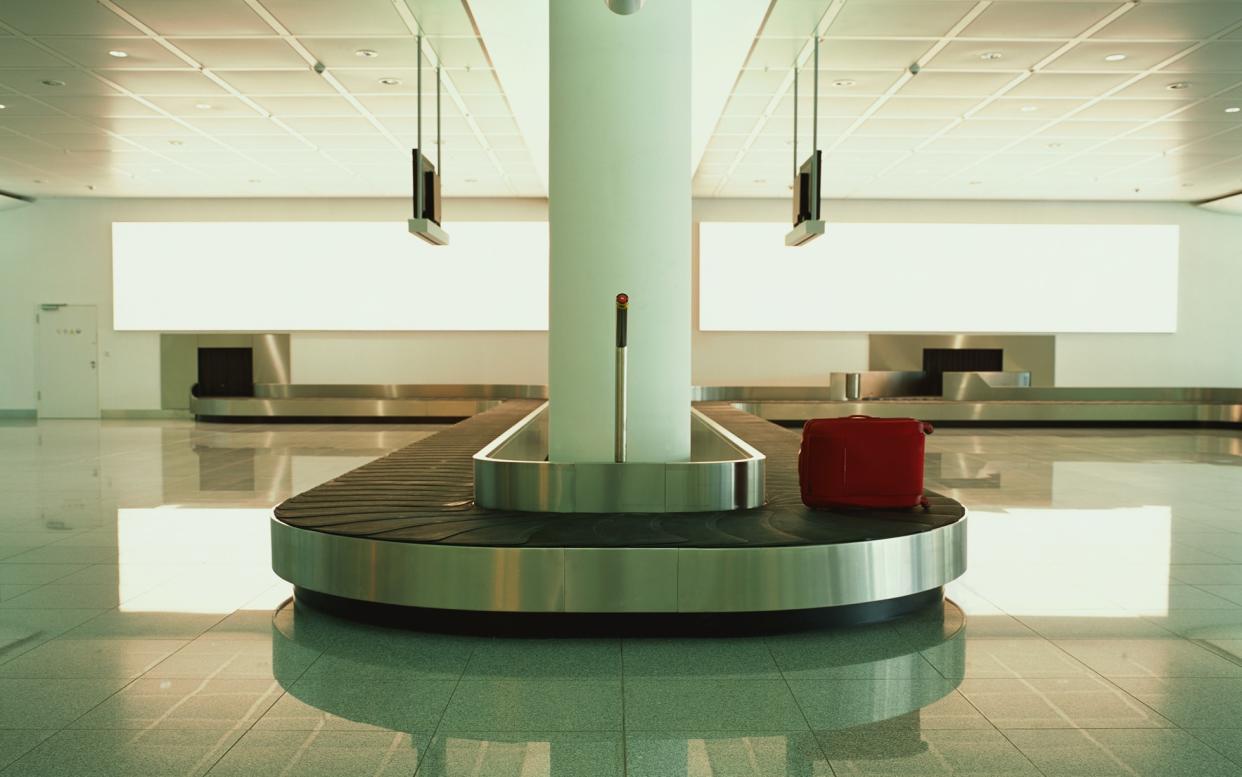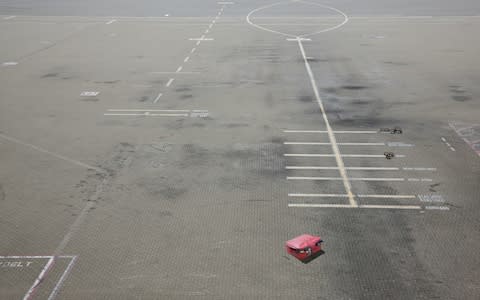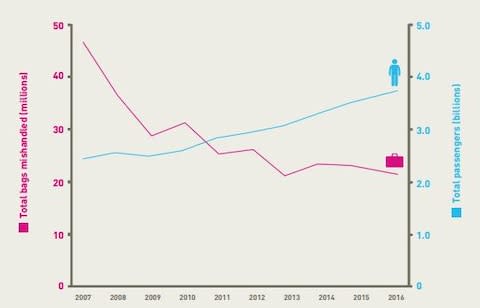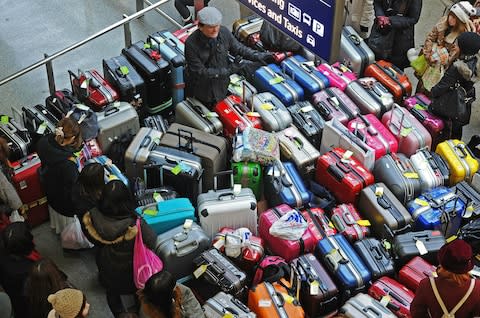What on Earth happens to lost luggage?

It’s one of a traveller’s worst nightmares - being the last person at the airport conveyor belt and coming to that slow realisation that your bag isn’t coming.
Such a sensation was felt by hundreds of holidaymakers departing Gatwick Airport last weekend, after a system problem meant a number of bags destined for flights leaving the North Terminal never made the plane.
Lost luggage can prove either highly irritating or, bizarrely, kind of convenient. If the airline loses your bag on the outbound flight, you’re left with only the clothes you travelled in, and might end up splashing most of your spending money on last-minute T-shirts and toiletries to carry you through.

• What happens to unclaimed items at airports?
If, on the other hand, your case goes walkabout on the way home, a complaint to the service desk would likely mean airport staff will electronically locate your luggage and - if they can find it - arrange for it to be couriered to you, meaning you’ll leave the airport empty handed and without the burden of dragging a suitcase full of dirty clothes home. After a particularly long trip, this can feel strangely like a positive. However, the airline will not help you unpack.
Do many bags get lost?
Research from SITA, the makers of the World Tracer System and producers of an annual report on the state of baggage handling around the world, found that 21.6 million bags were mishandled (lost or temporarily mislaid) in 2016 (down from 23.3m in 2015), a figure that translates as 5.73 bags per 1,000 passengers. Since 2007, the number of bags lost per 1,000 passengers is down from 18.88 to 5.73, a fall of 70 per cent.
Lost luggage vs global passenger numbers

This figure is against the backdrop of ever-rising passenger numbers (3.77billion in 2016) - since 2007 global passenger numbers have risen by a third, while the number of mishandled bags has fallen by half, saving the industry $2billion (£1.5bn).
Detailed consumer research into lost baggage from the Association of European Airlines suggested that 85 per cent of bags reported as lost are returned to their owners by courier within 48 hours, meaning they are “misdirected” rather than lost. SITA says reunion time is now down to 36 hours.
SITA's research found that of the 21.6million bags mishandled last year, 47 per cent went missing thanks to "transfer mishandling", i.e when passengers make connecting flights, 16 per cent because of "failure to load", 15 per cent due to a "ticketing error", and the remainder due to a mix of tagging errors, loading errors, and "airport/customs/weather/space-weight restrictions". "Arrival mishandling" accounted for 4 per cent of delayed luggage.
It is a small percentage of the mishandled bags that are actually lost. According to SITA, only 7 per cent are lost or stolen never to be reunited with their owners - up from 5.5 per cent in 2014.

How does Europe fare?
Not well. Asia should take a bow, however. With a baggage mishandling rate of just 1.81 per 1,000 passengers, the continent surpasses North America, with 2.7 per 1,000 passengers. But both eclipse Europe, which lags behind with 8.06 per 1,000 passengers. SITA puts Asia's success down to the "increased utilisation of advanced technologies in baggage handling systems".
Can I get compensation if my bag is delayed or lost?
If your bag is misdirected on the way out, the airline must give you money to buy replacement items or reimburse you for purchases you make to cover your loses while you wait for your bag. But they can be evasive and pass responsibility to any other airlines you have travelled with or your insurance company, Sophie Butler, Telegraph Travel's consumer correspondent, writes.
UK airlines allow 21 days to track your bag before it is considered officially "irretrievably lost". They trace it through an electronic tag put on it when you drop off your luggage, but bags can be difficult to find if a faulty or incorrect code was entered by the person who checked it in. At this stage, after a lengthy process of making a claim, you can get compensation for your bag.
How do I get my bag back?
All major airlines use the World Tracer System, which tracks a bag for 100 days and uses the information provided by you about the appearance of the bag as well as the journey history to try to locate it.
A spokesperson for Virgin Atlantic explains: "When a customer identifies their bag as missing, a report is made into a system which searches bags found with similar criteria. Bags found at an airport without a customer attached or missing a tag are also logged into this system with any details that can be established.
"The system works 24/7 searching for matches between the delayed bag reports the customer has made, and the found bag reports that the airline has made, and it makes suggestions for matches based on the criteria in the files. Our baggage-tracing team continuously looks at these matches, liaises with the airports and the customers, identifies the right bag and owner, and facilitates the return of the bag.

• Delayed airport luggage: your rights
"If a bag is missing, it could be due to belt or infrastructure failures, the bag may have become tagless, or short connection times may prevent bags getting from one aircraft to another. Usually a bag would be somewhere between check-in and the aircraft in a designated baggage area. If a bag is found later on, we will return it to the customer regardless of whether they’ve had compensation or not.
"If a bag is not picked up from a carousel, it would get held at the airport, and a found bag report would be logged. If the customer then realised they’ve left the bag they would be able to call up and arrange for it to be returned to them. If the bag is not requested or identified it is then stored for up to 90 days. After which if no-one has claimed it, and we cannot determine who it belonged to, it would then be disposed of."
• The world's strangest, weirdest and scariest airports
A spokesperson for British Airways said: "Usually we use continued tracing for a minimum of 90 days. Normally delayed bags travel on the next available flight, so in reality, it is very rare that we would still be tracing for that length of time."
What happens to unclaimed bags?
But, on the rare occasions that a bag remains lost where is it likely to end up? Surely, like lost socks from the washing machine, it must go somewhere?
If after 90 days no-one has been able to link you with your bag, it could end up like much of the other lost property that turns up in airports: at an auction house that sells on luggage, with profits going to charity. Greasbys in Tooting sells on bags subjected to this fate from various London airports, and airlines including BA, every other Tuesday. “It’s dirty clothing and bags, mainly,” said one employee.

Auction houses like this exist worldwide, with one of the USA's major sites being the Unclaimed Baggage Centre in Scottsboro, Arizona. It has contracts with all the major US airlines to buy lost cases, clean up the contents and sell them on to bargain hunters. Their emporium includes everything from diamond rings to ski boots, with all items sold at relatively cheap prices.


